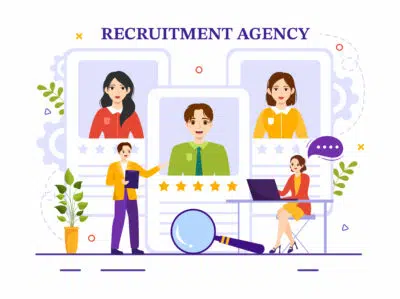Strategic Staffing: Leveraging Fractional Leadership For Competitive Advantage

Embracing agility: the role of staff augmentation in the modern workforce
February 5, 2024
Interim budget 2024 focuses on youth empowerment and innovation Industry
February 5, 2024
One of the crucial functions performed by the Human Resource department in an organisation is finding the right people for the job. Its mandate does not end there! HR handles employees’ skill development and training, employee engagement, compensation and wages, succession planning, and more. They have the tough task of maintaining the right balance between employers and employees.
All HR functions revolve around people. The crux of HR functions is strategic staffing so that the business has the right workforce to accomplish its goals.
What is strategic staffing?
Strategic staffing refers to aligning your workforce with your business goals. The purpose of strategic staffing is to ensure that your business has the right type of people in the right numbers. Strategic staffing optimises human resources to maximise the productivity and profitability of your enterprise.
Strategic staffing consists of several HR functions designed to achieve the objective of optimal resource management for the business to meet its current and future needs.
It starts with HR teams working with senior leaders to understand the organisation’s goals and aligning the staffing strategy to meet those goals.
Recruitment of the right talent according to these goals is the next step. Alongside recruitment, employee retention is also a vital part of strategic staffing.
For effective recruitment and retention, HR professionals work with individuals (employees and potential employees) to understand their career goals and aspirations. Based on the inputs they receive, they identify mutually beneficial opportunities for both current and potential employees.
They organise upskilling programmes to help employees stay updated with the latest needs of the evolving markets.
Another key element of strategic staffing is to forecast future demands. Based on this the roles and competencies required for future success are determined.
Benefits of strategic staffing

- Strategic staffing ensures that the right people are in the right positions at the right time, leading to improved productivity and efficiency within the organisation.
- By strategically planning and aligning staffing needs with business objectives, companies can optimise their human resource budget and reduce unnecessary costs associated with hiring and retention.
- Strategic staffing focuses on attracting and retaining top talent, ensuring that the organisation has the skills and expertise needed to achieve its goals. This boosts employee satisfaction and reduces turnover rates.
- Strategic staffing allows businesses to respond quickly to changes in the business environment, such as market fluctuations or new opportunities, by ensuring that the workforce is nimble and adaptable.
- A well-planned staffing strategy includes identifying and developing high-potential employees who can contribute to the organisation's strategic goals. This enhances the decision-making process by having a pool of talented individuals with diverse expertise and perspectives.
- Alignment of staffing with business strategy boosts organisational performance and competitiveness in the market. Strategic staffing ensures that the right resources are available to drive growth and achieve long-term success.
- Strategic staffing involves identifying and grooming potential successors for key positions within the organisation. This minimises disruptions and ensures a smooth transition when senior executives leave or retire.
- When employees see that the organisation has a strategic plan for staffing and development, it can boost their morale and engagement. They feel valued and motivated to contribute their best, leading to increased productivity and job satisfaction.
- Strategic staffing focuses on employee development plans and opportunities for growth, ensuring that employees have the necessary skills and knowledge required for their current and future roles. This too enhances job satisfaction and retention rates.
One of the biggest challenges for HR professionals in strategic staffing is fulfilling the organisation’s staffing needs within the allocated budgets. Employee cost is a significant factor to be considered in strategic staffing. Employee cost refers to the sum total of costs incurred for maintaining an employee — base salary, compulsory and territorial fees, training costs, employee benefits, etc.
Cost per hire has been increasing at a steep rate. According to the Society for Human Resource Management (SHRM), the average cost per hire which stood at $4129 in 2019 climbed to $4700 in 2023.
Another factor that makes strategic staffing challenging is the rapidly changing and unpredictable marketplace. To cope with this volatility, an organisation has to be agile and resilient. This requires flexibility in the workforce. In other words, the organisation needs skilled employees and expert leaders in specific areas depending upon the changing needs of the market. The role of the executive who leads these projects becomes extremely important. However, the cost of hiring such professionals with niche skills can be very high. Data reveals that the average cost per hire for an executive position is a whopping $28,329. Such high costs are not justified if the leader’s services are required only for a limited period.
Significance of fractional leadership in strategic staffing
Apart from these concerns, it is difficult to find the best leaders. This is where the concept of fractional leadership plays a vital role!
Fractional leadership refers to hiring leaders for the short term. Fractional leaders work project-by-project or on a time-based model and provide strategic direction to the organisation for a designated duration.
Availing the services of seasoned experts as and when required gives businesses the flexibility to hire the exact leadership capabilities they require for specific projects without having to get into long-term commitments or costs with the individual. The business benefits from the expert’s cross-industry experience while cutting down on its hiring costs.
For example, a full-time executive’s salary falls in the range of $200,000 annually; hiring a fractional leader can reduce this cost by 50-70 per cent.

How fractional leadership can provide your business a competitive advantage
Besides the cost factor, fractional leaders bring a lot more to the table which makes their hiring an indispensable part of strategic staffing. Fractional leadership can provide a competitive advantage to a business in several ways:
- Expertise: Fractional leaders bring specialised knowledge and expertise to the organisation. They have industry-specific skills and experience, which can help streamline operations, drive innovation, and make better strategic decisions. This expertise provides the business an edge over competitors who may not have access to such talent.
- Cost-effective: Hiring a fractional leader is a more cost-effective option than employing a full-time executive. Fractional leaders typically work on a part-time basis, allowing businesses to access their expertise at a fractional cost without the expense of a full salary, benefits, and overhead costs.
- Flexibility: Fractional leaders provide flexibility by working on a project or interim basis. They can be hired for a specific period or to address particular challenges or opportunities. This flexibility allows businesses to quickly adapt to changing market conditions, take advantage of emerging trends, or navigate through transitional phases, giving them a competitive advantage over rivals who may struggle with agility.
- Enhancing leadership team: Fractional leaders can complement existing leadership teams by bringing new perspectives and fresh ideas. They can act as mentors and provide guidance to the existing team, promoting professional growth and development. A diverse leadership team with varied insights and perspectives can drive creativity, problem-solving, and innovation, thereby giving the business a competitive edge.
- Scalability: Fractional leaders can support a business during periods of rapid growth or expansion. They can assist in scaling operations, entering new markets, or launching new products/services. Their experience in managing growth can help the business avoid pitfalls and seize growth opportunities, ensuring the organisation stays ahead of competitors.
- Focus on core competencies: By outsourcing leadership roles to fractional leaders, a business can focus on its core competencies. Fractional leaders can handle certain functions or departments, allowing the business to concentrate on its primary areas of expertise. This focused approach enhances productivity, quality, and customer satisfaction, which can lead to a significant competitive advantage.
Partnering with a staffing agency to hire fractional leaders
A fractional leader can deliver these benefits only if you select the right individual for your project. However, finding the best fractional leaders for your organisation can be like looking for a needle in a haystack. The task gets simpler if you team up with a professional staffing or Remote Process Outsourcing (RPO) agency. These agencies have a wide network and can fulfil your fractional leadership requirements quickly. They are well experienced in recruitment and can identify and select the best leaders for your organisation.
ConclusionCareernet is a leading RPO agency that has the expertise to fulfil the varied hiring needs of an organisation. We work with our clients to understand their strategic staffing goals and build a recruitment strategy that aligns with those goals. We find the best fractional leaders according to your specific project needs. Our end-to-end recruitment process frees you to focus on growth while our cost-effective hiring solutions boost the ROI of your business.
Resources: toggl.com,vincedholland.medium.com


